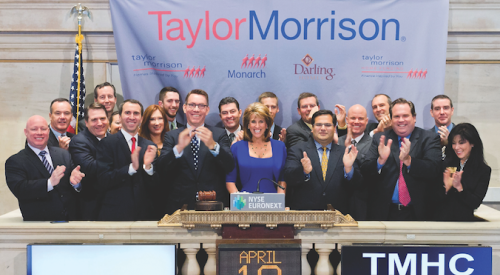The ink was hardly dry on last month’s issue of Professional Builder when those leapfrogging Giant builders on the cover did it again — playing games with our idea of bigness.
On May Day, Pulte Corp. pulled the trigger on a stock-for-stock deal to acquire Del Webb Corp., the active adult community superpower. Check our rankings and combine No. 2 Pulte’s $4.26 billion in annual home building revenue with No. 8 Del Webb’s $1.93 billion. The new, $6.19 billion Pulte is now the Big Enchilada. But how long will that last?
|
||||||||||||||||||||||||||||
Remember that just more than a year ago Lennar’s acquisition of U.S. Home boggled our minds by creating a new No. 1 at $4.9 billion in annual revenue. At that time (March 2000) this magazine warned that the first housing mega-merger might not be the last because Wall Street loves the concept of housing industry consolidation. Depressed share prices reduced the buying power of the top public builders for most of 2000 and kept them out of the merger and acquisition game. But the run-up in builder stocks that began last fall and continues today changed all that.
"Going forward, rising currency values (in public builder stocks) certainly seem to point toward a higher level of merger and acquisition activity," stock analyst John Stanley of UBS Warburg says. "KB Home and D.R. Horton were players in this game in the past, but they haven’t done much lately — although Horton did just acquire the Jacksonville, Fla., division of The Fortress Group. I’d look for more from both of those two before this year is out. They’re overdue."
We glean another nugget of wisdom from this latest deal: No matter how much the senior officers of the big public builders say they value the bottom line more than the top, bigger is better on Wall Street. And biggest is best of all.
Making the Deal
A final spike in Pulte’s share price, which was $36.32 on Feb. 15 and reached $46.78 on April 30, helped seal the Del Webb deal. The transaction value will be based on the 15-day average of Pulte’s closing stock price for a period ending three days before Del Webb’s next stockholder meeting (not finalized at press time). Based on that April 30 share price, the transaction has an equity value of about $800 million. Pulte also will assume outstanding debt of about $1 billion.
"Obviously, the companies operate in very different ways," says Florida-based stock analyst Tim Jones (Josephthal & Co.). "Pulte has a very strong balance sheet, high asset turnover. Del Webb has very low asset turnover, very long projects and high debt.
"Even with Pulte taking on $1 billion in debt, you come away with a pro forma balance sheet equal to the industry average. And Pulte usually spends about $1 billion each year on land. I think they will be able to cut their land purchases by about $200 million a year to pay down the debt and get that ratio down under 40% in a short time."
In fact, because the firms have such disparate operating methods, many builders question if this deal is purely a land play. Webb owns or controls 50,264 lots, primarily in the Sun Belt. "I wonder if it’s really the Del Webb brand and market segment that Pulte wants," Dallas builder Bill Darling says. "If they choose to enhance the Del Webb brand in active adult, master planned communities, Pulte certainly has the resources to extend that brand all over the country. But they’ve never shown much interest in active adult in the past."
Not a lot of interest, but some. Pulte’s acquisition in 1998 of systems-building maven Buz DiVosta’s South Florida firm put Pulte into moderately priced product in Sun Belt active adult communities. Don’t be surprised if DiVosta’s product begins to appear in Del Webb master planned communities.
Together, Pulte and Del Webb will hold leading positions in 44 markets across the country, with home prices ranging from $90,000 to more than $1 million. It seems likely that Pulte just couldn’t resist the prospect of introducing Del Webb’s powerful brand into its own land positions, close to major urban centers of the Northeast and Midwest. Match that with Pulte’s ability to increase absorption at Del Webb master planned communities in Arizona, California, Texas and Nevada, mix in the company’s new identity as America’s largest home builder, and this deal begins to look as complementary as a hand in a glove.
But some builders still have doubts. "It’s an interesting entry by Pulte into the acquisitions game," Kimball Hill president David K. Hill says. "It’s a good match in the way the parts come together. But these are very different corporate cultures. It will be fun to watch how that works."
John Wieland of privately held Atlanta Giant John Wieland Homes holds a similar view: "Pulte will bring a lot of efficiency to Del Webb, but I have to wonder about the limits to growth when companies get this huge. We’ve seen some serious quality issues arise at the outer edges of such companies.
"Big companies seem to have more of those problems, and they end up with people who are unhappy with their homes. They are also a bigger target (for litigation) when those problems arise." Atlanta entry-level builder Tom Bradbury (Colony Homes) expresses concerns that employees of an acquired firm — such as Del Webb — often are forgotten in the rush to bigness. "I’ve looked at this deal, and it’s a great one for Del Webb stockholders," he says. "But I’d worry about what would happen to my people. How much of Rayco’s culture is still there in KB? Public companies focus on enhancing shareholder value, but none of them focus very well on running a company the best way.
"We make hard decisions that pay off in the long run but may cost us in the short term. I’m not sure public builders can do that."
Florida builder Pat Neal has the same reservations. "We get calls from the big public builders all the time. It won’t stop. Land is getting hard to find. The public builders can do cash deals. The opportunity to get into that league is always enticing. But I’m not sure they value customers as highly as they should. If you don’t treat customers right, that’s the kiss of death."
Acquisitions advocate Don Horton of Giant D.R. Horton Inc. has no such misgivings. "The Pulte deal is a good one for the industry," he says. "Every consolidation is good. There will be more deals like this one and smaller ones like our acquisition in Jacksonville. The Pulte-Del Webb deal will spur everyone to think in terms of consolidation and growth by acquisition. We’ve done 15 of them and plan to do more. That’s the way it’s going to go."













